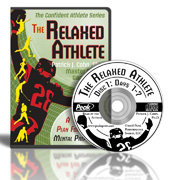
What is your biggest fear when dealing with an injury?
Every athlete has a unique and personal injury experience, meaning injury affects athletes differently depending on their perspective.
Sports injuries are multifaceted. Every injury has a physical, mental, and emotional component. Neglecting one of these components can delay the mental or physical healing process.
When you are injured, you will have three major concerns:
- The injury itself and its severity
- Rehab or time away from competition and training
- Return to action
Each phase contains its unique challenges.
Let’s examine the final phase of injury, returning to competition.
Most athletes want to get back to action as quickly as possible. They don’t want to lose their physical conditioning, role on the team, or potential contribution to the team’s success.
This urge to compete often causes athletes to return to action too soon.
The lack of physical and mental readiness causes athletes to underperform and increases the risk of re-injury. Underperformance can lead to confidence issues and performance slumps.
For example, San Diego Padres infielder Matt Carpenter suffered a foot fracture towards the end of the 2022 regular season while playing with the New York Yankees.
Before fully recovering from the injury, Carpenter returned for the Yankees’ playoff run.
While Carpenter’s return to action may seem heroic, he drastically under performed. In his first six postseason appearances, Carpenter was 1-for-12 with nine strikeouts. Carpenter under performed, and his early return to action significantly delayed his recovery.
CARPENTER: “I probably pushed it more than I should have to come back and play in October, and it kind of cost me the rest of my offseason. My foot just never healed. It was broken all the way until basically the day I signed [with San Diego].”
Understandably, you want to return to competition quickly. Especially since you primarily identify with being an athlete.
However, you should realize there is much at stake if you return to competition before you have recovered from your injury.
Create a recovery plan with your coach, athletic trainer, and doctor to maximize your physical and mental readiness for competition.
Your recovery plan should consist of mile markers to achieve before progressing to the next stage.
Some considerations to include as mile markers are being pain-free, achieving a pre-injury level of conditioning, overcoming the fear of re-injury, performing rehab exercises with a low level of discomfort
Also consider learning relaxation or stress-reducing strategies, visualizing performing at a high level, getting the approval from your doctor or physical therapist to return to training.
A specific, detailed injury plan will help you feel in control of the injury process and feel confident and prepared when you return to action.
Think of potential obstacles that will affect your rehab. For each obstacle, write down 1-2 ways that you can overcome that obstacle so you can be better prepared to compete.
Lastly, recognize the importance of patience and listening to your body so you are fully prepared to be on top of your game.
Related Sports Psychology Articles
- The Mindset to Perform at a Higher Level
- Having Fun While Performing at Your Best
- The Importance of Mental Toughness
*Subscribe to The Sports Psychology Podcast on iTunes
*Subscribe to The Sports Psychology Podcast on Spotify
Download a free sports psychology report to improve your mental game!
Learn more about our one-on-one mental game coaching.

The Relaxed Athlete
You can possess all the physical talent in the world, the best equipment money can buy, and train harder or longer than anyone else in your sport or on your team, but if self-doubt enters your mind prior to competition, you simply will not realize your true potential in sports.
The Relaxed Athlete” audio and workbook program teaches you mental strategies to develop a focused and confident pregame routine for a poised and relaxed mindset. Learn how to get your mind right by overcoming pregame anxiety and worry.
